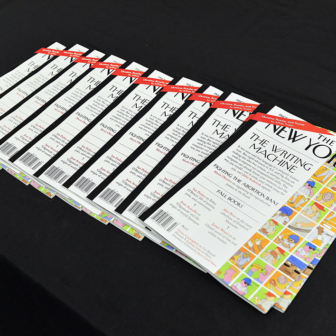THE skies over London are protected by circling jet fighters, stationary ground-to-air missile batteries and cluttering helicopters carrying military snipers. The streets of the city are patrolled by thousands of soldiers, policemen and whatever is meant by “security personnel.” By comparison, the barrage balloons put up to counter the German air force in two world wars were like benign sausages in the sky.
London’s conversion into a national security venue, riding roughshod over the freedoms, comfort and convenience of its inhabitants, is due, of course, to the Olympic Games, the four-yearly global athletics carnival that most countries want to host for the economic benefits that supposedly flow.
Surely it is time the international community abandoned this Olympic nonsense, and not just because of the massive cost and inconvenience of protecting the games, although that is bad enough. London’s preparations have plainly elevated Olympic security to new and dangerous levels of lethality.
It is also because the Olympic Games, while constantly expanding as spectacles, are shrivelling as sporting contests, despite the apparently infinite capacity of competitors to break records and despite the billions of dollars poured in by governments and corporations. Resources devoted to Olympic sport could be put to much better use supporting other human activities with infinitely greater benefits to populations everywhere.
The fact is that every Olympic Games is a massively state-subsidised carnival staged primarily for the economic benefit of global fizzy drink companies and television networks. The drink companies flog their sugary junk direct; TV companies sell commercial time during Olympic broadcasts at massively inflated rates. Mammon, not Mercury, dominates the Olympic Games and there are few substantial and durable benefits for the societies that host and fund them.
Each four-yearly event is debauched by scandals about the use of performance-enhancing drugs. A huge bureaucracy has evolved to stop athletes from using drugs, but pharmacology usually trumps vigilance as athletes pursue the cornucopia of sponsorship “deals” offered to gold medal winners.
Olympic contests also encourage the descent of countries into nationalistic primitivism and conflict, with the medal count seen as evidence of national superiority. (Of course it isn’t: it is merely evidence of how much a country can afford to pay to win a medal.) Australia, it has to be said, is particularly prone to this disease. This is partly due to sports journalism and television commentary that daily invests the pointless gyrations of Olympic athletes with an importance and portentousness that is beyond satire.
It is not just that Australian broadcasters, like all other broadcasters, focus mainly on the performances of their own athletes and teams regardless of the excellence of other performances. It is also that Australian Olympic officials brazenly demand increased Commonwealth funding for the elite Australian Institute of Sport in order to maximise the chance of big medal hauls. The gurus of Olympism (their word, not mine) are already warning that Australians might win fewer medals in London than they have won at other recent Olympic contests. Australians are taught to believe that Olympic loss is a cause for national shame and victory is a cause for national ecstasy. No other emotional response is possible. A more mature nation would reject such simplistic nonsense.
It is sometimes claimed that Olympic sport brings the youth of the world together in amity for friendly competition with beneficial consequences for international relations. Nobody familiar with the events during the Hungary–Soviet Union water polo match in Melbourne in 1956 would believe that sentimental nonsense. Nowadays Olympic athletes are self-seeking professionals who are rewarded only for demonstrating their claimed national superiority by winning at any price. International goodwill does not come into it.
Perhaps the cost and inconvenience of Olympic sport might be justified if athletes were positive role models for young and impressionable Australians (and others). Unhappily, too many are not. Some have engaged in well-publicised violence (and usually have been flogged with a feather in the national interest); others have performed spectacular dummy-spits (sometimes claiming racial bias) when not chosen for teams; others have used alcohol and drugs to excess and with disturbing consequences. There is no evidence that Olympic athletes encourage other young people to aspire to participate in sports.
Not surprisingly the Olympic boosters don’t consider opportunity costs of Olympic competition. What are the forgone alternatives? What benefits could have been received? What would they cost? The massive funding of elite sport and elite sporting infrastructure means that less funding is available for infrastructure that could be used (for example) by those who want to keep fit but who are less than athletic supermen and superwomen. Money taken from Olympics budgets could be used to provide facilities to improve the increasingly threatened physical health of those who now tend to be couch potatoes.
Funding used to support Olympic competition might also be redirected to help growing numbers of morbidly obese people in Western societies. Better dietary advice and health programs could be funded to reduce the diseases like diabetes that are now becoming rampant, partly because so many people over-indulge in the products marketed by Olympic sponsors.
Rather than put so many dollars into the elite sport basket there could be more funding for other elite activities with far greater cultural impact and durability. Mass audiences in sports-mad countries are served an over-rich diet of elite sport but precious little in the way of elite music, literature and other arts performance. Australia would be better served if its young musicians, writers and actors (and scientists, philosophers and others) were given the exposure, encouragement and resources now devoted to elite athletes. Australians might even discover the richness of creative talent in this country.
None of this should unduly impoverish Olympic athletes. They have generous global corporate sponsors who pay them to run and jump and swim and promote their often ephemeral food and fashion products. They have TV channels anxious to broadcast athletics carnivals on their networks. What elite athletes (a tiny minority of those who engage in physical activities) should not benefit from is the public funding now poured into subsidising their lives. Their activities add nothing to national culture and, if anything, diminish the national reputation. Do we really want to be a nation of Jock (and Jill) straps? •




